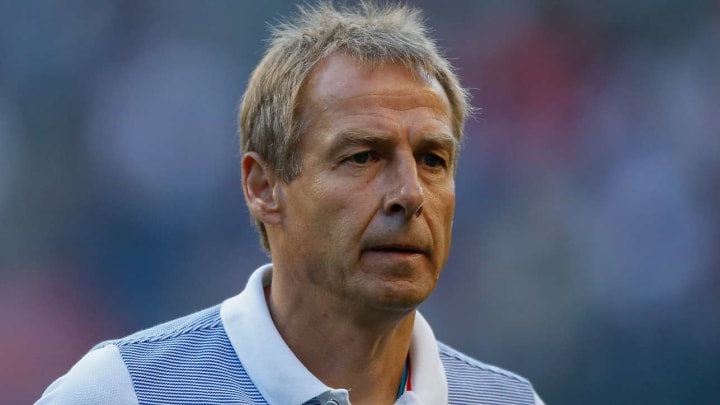2. Jurgen Klinsmann fired as U.S. national team coach; Bruce Arena hired

Jurgen Klinsmann vowed to take the U.S. national team to another level. And when he finally did—more than five years and some $20 million after saying ‘yes’ to an eager Sunil Gulati—he was fired.
He was fired because that level was a low one, and the stakes, lack of progress and increasing pressure on Gulati ultimately left the U.S. Soccer president with little choice. Much of what Klinsmann was hired to do, and much of what he promised, always was going to remain in the eye of the beholder. Style is subjective. Player development, professionalism, the growth of MLS—they’re debated constantly in the here-and-now but can only be measured accurately over the long term.
Jurgen Klinsmann leaves behind a complex, unfulfilled U.S. Soccer legacy
But certain standards had to be maintained. And during Klinsmann’s second World Cup cycle, the national team regressed. A moribund performance and fourth-place finish at the 2015 CONCACAF Gold Cup was a stunner—and perhaps an outlier. But Gulati was starting to contemplate alternatives. Then came the March defeat in Guatemala. Although a run to the Copa América Centenario semis stayed Gulati’s hand this summer, there was a palpable tension around the team. Losing to Mexico in Columbus probably was going to happen at some point. But Klinsmann’s decision to play three in the back and then blame his players postgame wasn’t inevitable or necessary. On November 15 in Costa Rica, his disjointed squad capitulated in a manner unheard of for men in a U.S. jersey. And so the plug finally was pulled, with no obvious progress accompanying the very steep price.
In came Bruce Arena, the former U.S. coach who succeeded at one World Cup and failed at another but arrives now with far more experience than he had when his first national team stint began in 1998. Amid the contrast between Arena and Klinsmann, U.S. fans must hope Gulati and his successors find the seminal lesson of the Klinsmann experiment. National team coaches work primarily with the finished product, and they do so minimally, a week or so at a time outside major tournaments. Their impact as visionaries who might overhaul a culture from the grassroots is going to be limited, especially in modern soccer. Klinsmann’s idealistic clashes with the likes of Landon Donovan and Don Garber produced little more than headlines. The German-Californian had some good ideas, but they remained just that.
The worst losses of Jurgen Klinsmann's USMNT tenure
What a national team needs is a manager who understands chemistry, team-building and managing relationships. He must have a handle on a player’s strengths, weaknesses, habits and limitations and should institute a tactical framework that allows for quick adaptation and the expected flux in personnel. Lineups and circumstances change constantly. If players have a sense of what’s coming and what’s required, confidence increases and they’re a step ahead. Arena gets that.
“We need to build the chemistry of this team and have a common goal and really work on the team concept,” the five-time MLS Cup champion said when hired in November. “I really believe individually and positionally we have good players, and we’ve just got to get them working together as a team. There are no real secrets on how you build good teams. It takes a lot of hard work. It takes communication. It takes discipline, and it takes some talent. And I think we have enough talent to build a good team and end up in Russia in 2018.”
The Americans are 0-2-0 and in last place in the Hexagonal. It’s a place they’ve never been, and hardly the sort of frontier Klinsmann was expected to explore. If 2016 was about the death throes of his ambitious but tumultuous tenure, 2017 will be about reorganization and recovery.

A lifelong soccer player, coach and fan, Brian Straus joined SI in 2013 after covering the sport for The Washington Post, AOL and Sporting News.